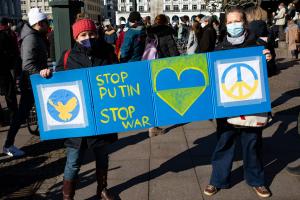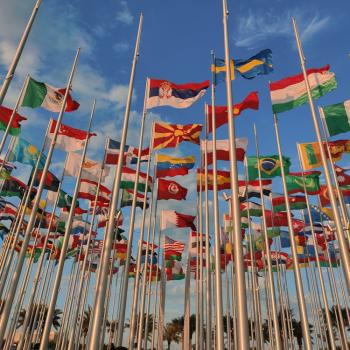
As Jesus is the prince of peace, Christians who follow him are called to promote and defend peace. But, just as an unjust law is no law, so a false peace is no peace. Christians, who are to follow the law, are not expected to follow unjust laws; though they are to seek after peace, they are not to support or promote a false peace. “Peace at all costs” is not true peace as it relies upon and accepts injustice so that the appearance of peace can be maintained. Christians must recognize true peace requires the elimination of evil, both in the temporal sense, and so in relation to what is done in history, but also in the eternal sense, which is what Christ has done on the cross.[1]
Christians must not to support violent, bloodthirsty tyrants, giving in to their unjust demands, because in doing so, all they do is support evil, not the common good. Early Christian martyrs would not sacrifice to Caesar, knowing that if they did so, not only would they be doing evil themselves, they would be promoting the brutal regime which such sacrifices represented, as they would indicate they would sacrifice anything to satisfy Caesar’s desires. In the modern world, this is why Christians cannot and must not sacrifice Ukraine to Putin. If they did so, they would be supporting and promoting Putin’s evil desires in and for the world (starting with the people in Ukraine), meaning, there would be no true peace established by their appeasement.
We must not fool ourselves. Putin is not going to stop with Ukraine. He, and others who are with him in his violent war of aggression, have made their plans clear: he desires to take over and control all the lands Russia used to possess, and anyone who would deny him will face his wrath. He will invade other countries, and he will use force to maintain control over them once he has invaded them, making everyone submits to his will or else risk imprisonment, forced servitude, or death. While Christians should want the war of aggression against Ukraine to end, they must realize that to end it, they cannot indulge Putin’s demands, as all they would do is enable Putin to engage further, and worse wars in the future.
This is something the just war tradition understands. Yes, there are problems with the tradition. Christian understanding of war needs to be further developed, starting with explaining better the meaning and intend behind the phrase “just war,” perhaps even finding a new name to use to deal with what is intended by it so not to cause confusion. War itself is never just. Calling the tradition the just war tradition suggests sometimes war is just and good and something noble, but that is not what is intended by it. War is always an evil. The notion behind the terms “just war” is that there are times that a proper defense is justified, and those who engage that defense, though they engage in evil, are justified in doing so, similar to the way in other situations, what is normally unacceptable (like stealing) can be acceptable (stealing food in order to survive another day). It is important that we recognize violence is never good, but we must also understand those culpable for the “justified” evil involved in a “just war” are the aggressors who force people to act in ways they normally should not act. Thus, the actions waged in a just war, as they are evil, must not be considered good, but on the other hand, it must be recognized that doing nothing can and will lead to a greater evil, and the one who do nothing to stop evil when they could, are culpable for that greater evil. This does not mean a defender is allowed to do anything they want in war; just wars require more than just causes, but also just means; they must use the least amount of force necessary to repel evil and to restore that which is good, which is why targeting civilian targets such as hospitals or universities are unjustified war crimes, and those claim the right to defend themselves cannot use that right to defend such actions (and those who see such actions being taken must denounce them).
The goal of a “just war” must not be war and destruction, but a just peace:
Great is peace, for peace is needed even at the time of war, as it is said WHEN YOU APPROACH A TOWN TO ATTACK IT, YOU SHALL OFFER IT TERMS OF PEACE (Deut. 20:10). [2]
Those who engage a proper defensive posture must promote justice and the greater good, so that in the end, the war can end with the promotion of true peace:
Your will ought to hold fast to peace, from the necessity and preserve you in peace. Peace is not sought for the purpose of stirring up war, but war is waged for the purpose of securing peace. Be, then, a peacemaker even while you make war, that by your victory you may lead those whom you defeat to know the desirability of peace, for the Lord says: ‘Blessed are the peacemakers for they shall be called children of God.’ [3]
Anyone who would embrace war for the sake of war, those who are bloodthirsty and do not care about the human costs of war, have not embraced the spirit of peace; their actions, insofar as they come from and embrace such evil intentions, cannot be justified. Thus, even in war, those who are justly defending themselves, should care about human dignity and the lives which are being wasted, understanding that many who are a part of their enemy’s military might are not a part of it freely, that they have been forced to take part in the war. This recognition will help those who defended themselves from an unjust aggressor to overcome a spirit of vengeance, which they need to do if they are to establish a lasting peace, healing the harm which was been done to all. Christian understanding of peacebuilding, therefore, look for what is good and true, promoting the good, helping to build upon the good which is there:
It is really quite clear that those who seek evil for the just person are not the only ones who speak vanity, but so does everyone who strives to bring evil upon anyone else. For he who seeks to do evil is not speaking the things that are according to God. And this is why we ought rather to seek what is good. If we could only return good for evil even toward those who hate us, either persuading our enemies what the good is or working to call their defiant souls back to harmony and peace, we might then become the children of the “Father who is in heaven, who commands his sun to rise upon the good and the bad and who rains upon the just and the unjust.”[4]
This is not to say that those who are responsible for the evils committed in war are not to be held responsible in some way for the evil they caused. For a just peace to be established and last, they are going to have to make reparations to the world, probably for the rest of their lives (and beyond), even as they will have to be prevented from ever having a position of power or authority ever again, making sure they do not find a way to gain power and breach the peace in the future. Those who have done evil have to atone for their crimes, and those who have done great evil, have great atonement to make; any attempt to create a peace without recognizing this, is not going to establish true, lasting peace. This is why in the conflict between Russia and Ukraine, any resolution which allows Putin to remain in power and build up his military might instead of having him forced out of power and required to make restitution for the evils he has done with his power is not an honest peace plan, but rather, the way for a false peace and further, and worse conflict in the future.
Christians need to embrace the full path of peace. Even in war, they must work for peace. They must do whatever is needed to make for lasting peace. This does not happen if brutal tyrants are appeased and given what they want to establish a “cessation of hostilities.” Again, this is why we cannot appease Putin and give in to his demands. He represents an existential threat to the world. We would be delusional if we thought giving to him what he took over in Ukraine will bring about peace, for all we would be doing is sacrificing Ukraine for the sake of a false peace. As his previous actions indicated, he will take out his anger on those who resisted him, torturing or killing them, even as he plans to replace the population in Ukraine with those who support his own desire to build up and establish an empire. Then, when he, or his successor, is ready, neighboring countries, those he has already indicated he wants to control, will be invaded, and all that has been done in Ukraine will be repeated in the future, including the false justifications for the war and the claim that peace can be had by appeasing him.
We must not forget what is happening in Ukraine; we must not let it be a forgotten war, or shrug when we hear what is going on, as Pope Francis said in a letter to His Beatitude Sviatoslav Shevchuk (as quoted on Vatican News):
Pope Francis added that he was sorry that, “in an increasingly dramatic international context, the one in Ukraine risks becoming a ‘forgotten’ war. It is our duty, instead, not to allow silence to fall over it, not simply to keep alive the horror in the face of such tragic facts, but above all to commit all those who have responsibility and the international community to the search for peaceful solutions”, he said.[5]
Pope Francis is a man of peace. He wants peace in the world. He constantly exhorts the world to come to peace, sometimes, in such a way, people misunderstand him. He wants people to think beyond the immediate situation, to see the complex causes of wars, and also what we can and should do in the future to help bring about peace in the world. He must not be seen as supporting Putin, as he is not doing so; he has decried the evil Putin has done and the way he has abused religion to justify war. He knows the evil which is going on in Ukraine, the evil which Russia has and continues to commit. He wants it to end. He wants peaceful solutions to prevail. He understands in just war tradition, those who are justified in embracing a defensive posture must still want and work for peace, which is why he sometimes reminds Ukraine they must work for peace. This does not mean Ukraine needs to appease Putin. We all should want peace and so work for it. We should not forget what is happening in Ukraine, or in other places in the world, because if we do, we will not be able to have the peace we need. To establish it, we must work for and establish the justice which is necessary for peace.
Lasting peace in Ukraine cannot be to accept Putin’s invasion and let him keep what he has taken over. That will only encourage him. Lasting peace must include ending Putin’s power and control, and to have Russia help pay back the world for the evil it has done. Anything else, and any appeal to peace will end with a false peace that will support grave evils in Ukraine and further wars in the future.
[1] That is, real peace requires the removal of that which is evil, as St. Albert the Great recognized in relation to eternal peace: “ To the next, one must reply that peace consists in the removal of evil, and this is caused by the Passion. And there is peace in advancing toward the God who glorifies, and this is caused by the Resurrection,” St. Albert the Great, On Resurrection. Trans. Irven M. Resnick and Franklin T. Harkins (Washington, DC: CUA Press, 2020), 138.
[2] Reuven Hammer, trans. and ed., The Classic Midrash: Tannaitic Commentaries on the Bible (New York: Paulist Press, 1995), 231.
[3] St. Augustine, “Letter 189 to Boniface” in Letters 165 – 203. Trans. Wilfrid Parsons, SND (New York: Fathers of the Church, 1955), 269.
[4] Origen, Homilies on Psalms 36-38. Trans. Michael Heintz (Washington, DC: CUA Press, 2023), 192 [Homily 2, Psalm 37 [38]].
[5] Vatican News, “In Letter To Shevchuk, Pope Decries Latest Missile Attacks On Ukraine,” (1-12-2024).
Stay in touch! Like A Little Bit of Nothing on Facebook.
If you liked what you read, please consider sharing it with your friends and family!
N.B.: While I read comments to moderate them, I rarely respond to them. If I don’t respond to your comment directly, don’t assume I am unthankful for it. I appreciate it. But I want readers to feel free to ask questions, and hopefully, dialogue with each other. I have shared what I wanted to say, though some responses will get a brief reply by me, or, if I find it interesting and something I can engage fully, as the foundation for another post. I have had many posts inspired or improved upon thanks to my readers.













